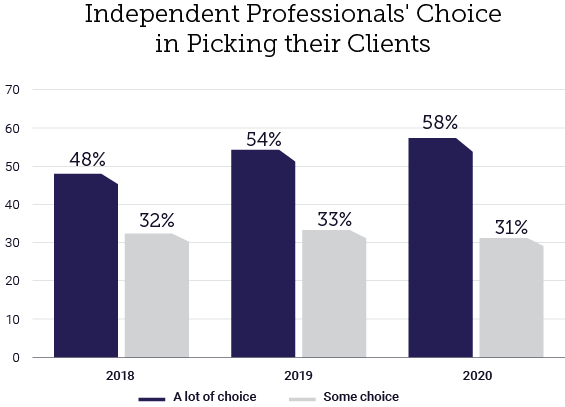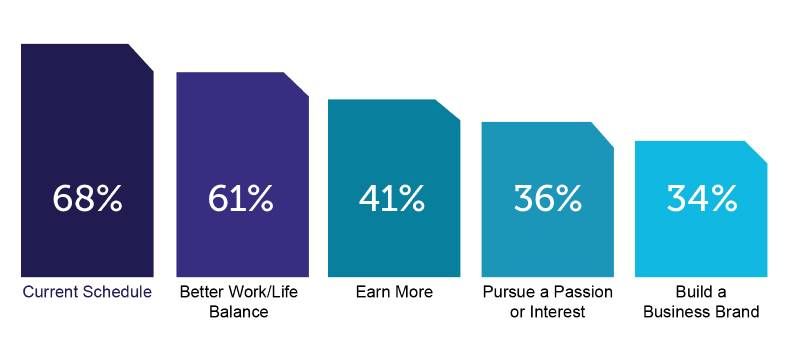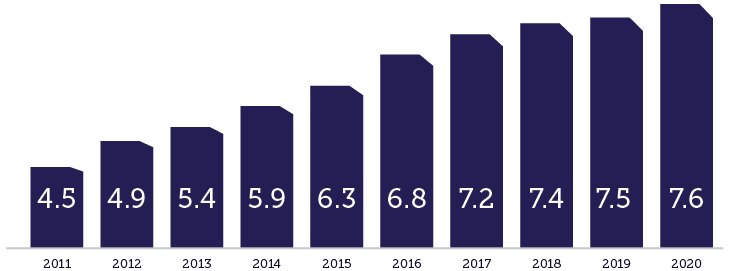Client of Choice
How to Attract Top Independent Talent
Client of Choice
How to Attract Top Independent Talent
Enterprises who want to remain agile and competitive are shifting their workforce strategies to include top independent talent. To attract and retain these elite workers, organizations must understand what motivates this pool of talent and modify strategies and processes to meet those needs.
Enterprises who want to remain agile and competitive are shifting their workforce strategies to include top independent talent. To attract and retain these elite workers, organizations must understand what motivates this pool of talent and modify strategies and processes to meet those needs.
For years, the balance of power has been shifting.
As the self-confidence and self-assurance of independent professionals have increased, the balance of power has been shifting away from employers and towards workers.
Over the four years that we have conducted research on this topic, we have seen an annual increase in the percentage of independent workers saying they have a lot of choice in picking their clients. Interestingly, choice often increases as the worker's income increases.
Among independents making more than $100,000 annually, 64% said they have a lot of choice in picking clients. 86% of independents also say they are either very satisfied or satisfied with the clients they choose to work with.

Which factors matter to independent professionals?

It's not about the money.
Companies must understand that the motivations, goals, and needs of independent workers may differ significantly from those of the traditionally sourced external workers they have retained in the past.
While stability, benefits, and a steady income are all reasons to stay in a full-time role, the number one reason that independents choose their path is choice. On every major issue related to choice and control, independent professionals expressed a greater preference than the independent workforce at large.
In our latest study, 79% of independent professionals said they are intent on continuing on their path and 74% were optimistic about the future of their careers. 59% said they wouldn't choose to go back to a traditional job.

Independent professionals express an overwhelming need or desire to get personal satisfaction from their work, with 77 percent saying that it is more important to do something they like than to make the most money.
Independent professionals express an overwhelming need or desire to get personal satisfaction from their work, with 77 percent saying that it is more important to do something they like than to make the most money.

Many attributes cited as influencing client choice and satisfaction have to do with the working relationship.
In a real sense, the onus falls on companies to distinguish themselves so they can remain attractive partners for these sought-after workers. Fortunately, our survey highlights the attributes and practices that selective independent professionals are seeking.
Independent professionals are very clear, even emphatic, about the factors that influence why they choose the projects and clients they work with.
90% of workers surveyed indicated that making a difference with their work is one of the key reasons they work independently. For the fourth year in a row, "valuing my work" was the single most important factor independent professionals list in deciding who they work for. 64% of independent professionals were nearly unanimous in identifying "control over my work" as a key driver to satisfaction.
Independents are critical to a growing number of employers.
No longer a curiosity, independent professionals are "a critical mainstay of the workforce for a growing number of employers," the Deloitte 2019 Human Capital Trends report finds. These professionals are more experienced, more educated, and better compensated than typical independent workers. And they can fill key positions in all functions, including hard-to-find skill areas such as specialized management consulting, engineering, IT, marketing, and innovation roles like research and product development.
The growth of this segment of the workforce presents both opportunities and challenges to large employers.
Companies in highly-competitive industries have long strived to be the employer of choice in their sector. Now, given the importance of highly skilled independents, they must figure out how to be the Client of Choice.
Number of Independent Professionals (in millions)
- 2011
- 2012
- 2013
- 2014
- 2015
- 2016
- 2017
- 2018
- 2019
- 2020



To engage with independent professionals effectively, companies will have to think more creatively about their talent strategy and the role of external talent. Rather than simply figuring out how to access labor, companies need to figure out how they can become the Client of Choice for highly skilled workers.
How to Become a Client of Choice
Rather than simply figuring out how to access labor, companies need to figure out how they can become the Client of Choice for highly skilled workers. They will have to give the same in-depth thought and effort to working with independent professionals as they do to attracting, retaining, and developing full-time employees.
They can do so by understanding what motivates skilled independents and then tailoring their strategy, processes, and ways of working to appeal to this pool of talent. Companies should be prepared to pay a premium for highly skilled professionals. And to keep these workers happy, satisfied, and engaged, they will have to integrate them into their teams and culture to the fullest extent possible while meeting their very human needs for connection and development.
5 Steps Enterprises Can Take to Become a Client of Choice
Incorporate them into your team
Provide opportunities for learning and building skills
Build a positive work environment
Value their work
Create reasonable processes and procedures
For more independent workforce trends, read our 2023 State of Independence Report.
For more independent workforce trends, read our 2023 State of Independence Report.

Independent Professionals are experienced and educated
Independent professionals are older, better educated, and have higher incomes than both the general independent workforce and the American (traditional, full-time) workforce at large.
Some 71 percent have four years of college or more, a significantly higher proportion than all independents (39 percent), and more than double the rate of all American adults (34 percent). Three in ten independent professionals (30 percent) possess graduate degrees.
The average independent professional has 9.5 years of experience working independently, works with 4 to 6 clients at a time, and has been working with existing clients for an average of 3.6 years.












